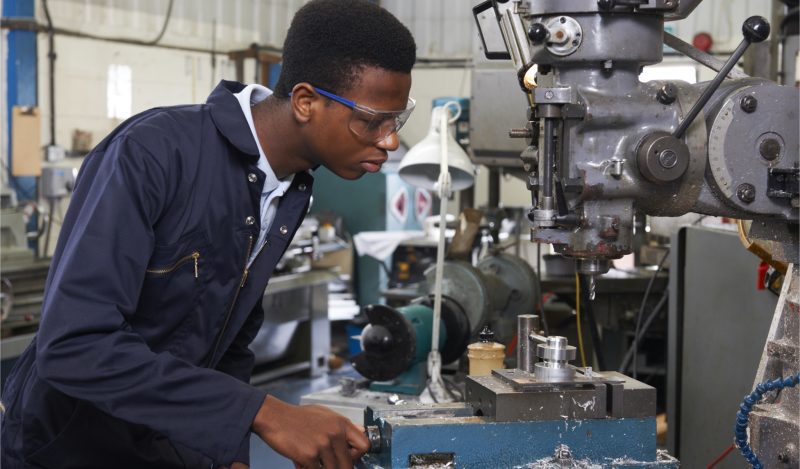It’s bad enough that we are experiencing the worst inflation in most people’s lifetimes. It’s happening during a tremendous shortage of goods and supply chain breakages. So many features of our production structures are wrecked that it’s hard to list them all. Meanwhile, our politics is an utter mess – Washington is without a clue – with no hope for fixing anything for a very long time.
To top it all off, the labor shortage is acute and getting worse. Half of small businesses report that they cannot get workers. Why not? Child care is unavailable for mothers who want jobs, hardly a surprise given the regulations and the closures, and now vaccine mandates. People have moved away from places like Massachusetts, West Virginia, Maryland, and New York, where the problems are worse. The immigrants who want to work are in short supply.
There is also an unspoken problem that is deeper and more philosophical. It is a generalized demoralization that has affected many people who would otherwise work in the service industry. The shutdowns sent a message that their jobs are not really important and can be taken away in an instant, replaced by direct cash infusions. Many in this group turned to drugs, alcohol, and just a generalized loss of ambition.
The old routines — the presumption that life is about hard work and climbing a professional ladder — were utterly shattered. The liturgy of life itself was made illegal, the ethic of productivity forcibly replaced by mandated idleness that has gradually mutated among many people into a form of nihilism. Now millions who are missing from the workforce have given up on that hope and embraced a do-nothing life to fit in with the cynicism of politics. The rituals of being productive and making money as part of a life project were deleted and now they are not coming back soon.
The mask and vaccine mandates do not help either, and even now these are required all over the country. It’s utterly degrading to be forced to mask up while the people you serve can eat and drink without their faces covered. This surely has intensified the labor shortages. I would love to see an experiment here: change nothing but the mask mandate and see how much that alone alleviates the labor shortage in the service industries.
Please allow me to go out on a limb here a bit and speculate on what could be another path forward. Interestingly, J.D. Tuccille recently observed that we’ve seen a boon in youth employment. For decades now, the experience of getting a job as a teenager was becoming ever more rare. Now it is on the upswing, in part because the schools closed leaving nothing for young people to do. To get a job at least represents some excitement, some evidence that is not entirely about scrolling through notifications on one’s phone.
“The pandemic-era disappearance of many adults from the job market was a welcome opportunity for many teens who, in contrast to their elders, want to work,” writes Tuccille. “Teens are getting jobs in numbers not seen since the heyday of malt shops and drive-ins.”
Have a look at this chart. In 1978, 60% of 16 to 19 year olds held jobs. That gradually fell over the decades. At the lowest ebb during lockdowns, that fell to 30%. Meanwhile, the schools were shut and sports programs ended. The whole scene created a true trauma for an entire generation.
So it is surely good that we are seeing increases here and more and more businesses are relying on teen labor in times of general shortages.
And yet there is a problem. Severe labor restrictions forbid people from full participation in the workforce until in the last year of high school or first year of college. Yes, you can get a job at 16 but only with limits. There are a very thin set of conditions under which you can even work at 14 but the red tape is impossible for many businesses. One solution — if politics really worked in this country — would be to liberalize the restrictions on teen labor.
Yes, we call it “child labor” but that’s ridiculous. It conjures up images of 7-year-olds in coal mines. The truth is that the labor laws, imposed for the first time nationwide in 1938 as an FDR strategy to statistically reduce the number of unemployed, are brutal on kids. It prevents them from doing exciting things like work in restaurants or hotels or otherwise discover a world in which they are valued as human beings via participation in commercial culture.
These restrictions are also awful for parents. They see their 13-year-olds losing interest in school and turning to other dangerous pursuits that are not good for their bodies and minds. They would love to see them get to work in a meaningful job, perhaps after school or two days a week or on weekends. But the law prohibits it. Unlike when I was a kid, these laws are seriously enforced now.
The kids faced enormous abuse from pandemic policy over the last two years, torn from their social circles, and the meaning of life itself brought into question with their schools closed while being forced to stay home and go absolutely nowhere. They were just supposed to wake up, do nothing all day, go to sleep, wake up and do nothing, and so on without end. It’s been an appalling cruelty.
Many have discovered another path through opportunities to participate in commercial life. That’s surely a good thing. The least that society could do at this point would be to allow them to enter the world of work and earn money. This is why the age of entry to the workplace should be lowered. Why not allow them into grocery stores to stock shelves, make burgers in fast food places, or take tickets at the movie theater or whatever it is going to be? Why not let them work in the warehouses, which are paying very high wages now, meeting new people, start saving money, and experiencing something adventurous?
Yes, I’m profoundly aware of the taboo of this topic. Generations have believed themselves to be doing good by banning teens from the workplace or only letting them in under very tight rules. The same society that thought it was just fine for kids to be in solitary confinement in their homes doesn’t believe it is cruel to ban them from learning the ropes at a modern warehouse or mall. There is no consistency here. I’m not talking force. I’m talking opportunity here, some pathway toward making life meaningful and exciting.
Why not allow them to get out of the house and leave the regimentation of the school where they are lectured, hectored, and propagandized, and into a world in which they are valued and paid for their value?
And let’s be clear about the history of the current restrictions. In 1938, the relationship between child labor and compulsory school was direct. It was at the very time that governments at the state and local level were banning labor for kids that these same kids were subjected to force in making them go to school.
You can talk all you want about labor exploitation, but it makes no sense to overlook a situation surely as problematic: any kid not in his or her school desk was subjected to be kidnapped in the name of enforcing laws against so-called truancy. A system that worked without coercion was displaced by a system that depended fundamentally on coercion.
Today, they are forcibly kept out of the workforce and then we are shocked to discover that the average college graduate today has a hard time getting into his or her groove at the age of 23.
When I was a kid, you could get around the laws if you knew the right people. Or you could just lie about your age. I was doing yard work at 11, tuning church organs and moving pianos at 12, digging water wells at 13, sweeping floors and crushing boxes at 14, and so by 15 I was ready to do dishwashing and roofing. These are all extremely fond memories for me, and they are more prescient than the endless hours in the classroom.
Today this would not be allowed because the laws are heavily enforced, and any employer who hires underage is subjected to terrifying penalties. Meanwhile, the kids were forced in the name of virus control to stare at their computers from their bedrooms for two years. Plus, we have a massive labor shortage!
A century ago, we invented a system that imagined children as civic soldiers. Kids bolted to chairs with absolutely no skin in the game have abstract “information” pounded into their heads by tax-paid instructors who teach from state-approved books. Then they had their own schools shut for a year or two. It’s no wonder we have a crisis of demoralization among the youth.
We push these kids through the system and deny them any chance to realize their human value in gainful employment in a community of productivity and real learning. Then we shut their schools and demand that they stay away from everyone else. Now we tell them to scrape together $100,000 for yet another degree that will somehow gain them entry into the workforce, but all these demoralized and cynical kids end up with is an empty CV and 15 years of debt.
By comparison, holding down a real job and getting paid is a tremendous liberation, especially following these terrible and cruel school shutdowns. It’s time we stop congratulating ourselves for taking away respectable professional opportunities from kids. Their lives have been utterly wrecked during this pandemic response. A slight consolation would be to celebrate when the kids want to work, earning money, feeling valuable, and finding some meaning beyond mere compliance with schoolmasters and bureaucrats.
Published under a Creative Commons Attribution 4.0 International License
For reprints, please set the canonical link back to the original Brownstone Institute Article and Author.









